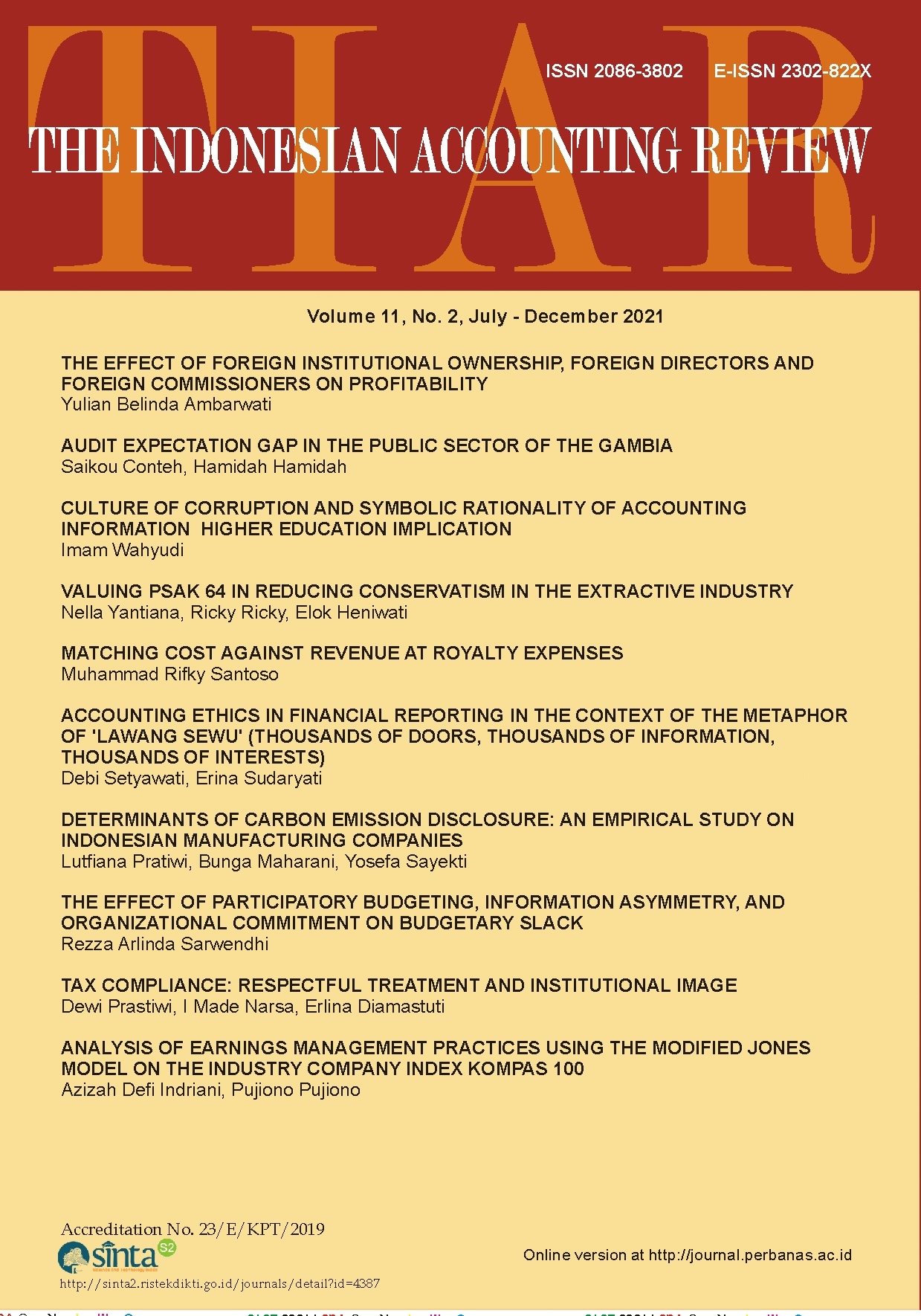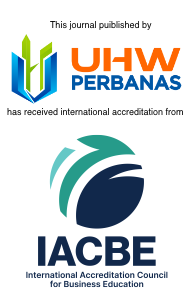Matching Cost Against Revenue at Royalty Expenses
DOI:
https://doi.org/10.14414/tiar.v11i2.2558Keywords:
intangible asset, matching cost against revenue, royalty, sales.Abstract
The recording of royalty expenses must not only be consistent but also complied with the principle of matching costs against revenue, especially in calculating taxable income. If all accounting principles are not met in recording the royalty expense, the tax authority will correct it  so that the royalty expenses cannot be deducted from taxable income. By using a case in a tax court in Indonesia, there is a taxpayer who does not meet the matching cost against revenue principle when recording royalty expenses. The taxpayer deducts these royalty expenses for the previous year in the current year because the amounts of these royalty expenses are known exactly in the current year. Even though the taxpayer's financial statements were audited and had an unqualified opinion, the Directorate General of Taxes (DGT) as the tax authority in Indonesia negated the royalty expenses as a deduction from taxable income. This paper finds that a net sales-based royalty fee scheme can be estimated at the end of the year and deducted from gross income without waiting for a certainty on the amount of royalty expense on invoices received in the coming year. The accounting records of the taxpayer are not proper so that some data or documents cannot be proven in the tax court. The method of recording in the financial statements with an unqualified opinion does not guarantee that the recording follows tax regulations, especially following Generally Accepted Accounting Principles (GAAP).
References
Armstrong, Christopher S., Jennifer L. Blouin, and David F. Larcker. 2012. “The Incentives for Tax Planning.†Journal of Accounting and Economics 53(1–2): 391–411. http://dx.doi.org/10.1016/j.jacceco.2011.04.001.
Aubert, François, and Gary Grudnitski. 2014. “The Impact of SOX on Opportunistic Management Behavior.†International Review of Financial Analysis 32: 188–98. http://dx.doi.org/10.1016/j.irfa.2013.12.003.
Bayer, Ralph-c, Harald Oberhofer, and Hannes Winner. 2015. “The Occurrence of Tax Amnesties : Theory and Evidence ☆.†Journal of Public Economics 125: 70–82. http://dx.doi.org/10.1016/j.jpubeco.2015.02.006.
Bousquet, Alain, Helmuth Cremer, Marc Ivaldi, and Michel Wolkowicz. 1998. “Risk Sharing in Licensing.†International Journal of Industrial Organization 16: 535–54.
Brushwood, James D., Derek M. Johnston, and Stephen J. Lusch. 2018. “The Effect of Tax Audit Outcomes on the Reporting and Valuation of Unrecognized Tax Benefits.†Advances in Accounting 42(June): 1–11.
Caballé, Jordi, and Ariadna Dumitrescu. 2020. “Disclosure of Corporate Tax Reports, Tax Enforcement, and Price Information.†Journal of Banking and Finance 121.
Desai, Mihir A, and Dhammika Dharmapala. 2009. “Corporate Tax Avoidance And Firm Value.†The Review of Economics and Statistics 91(3): 537–46.
Direktorat Jendral Pajak. 2011. “Susunan Dalam Satu Naskah Undang-Undang Pajak Penghasilan.†Undang-undang Nomor 36 Tahun 2008: 132.
Drake, Katharine D., Russ Hamilton, and Stephen J. Lusch. 2020. “Are Declining Effective Tax Rates Indicative of Tax Avoidance? Insight from Effective Tax Rate Reconciliations.†Journal of Accounting and Economics 7(1): 101317. https://doi.org/10.1016/j.jacceco.2020.101317.
Fontaine, Charles, Antoine Haarman, and Stefen Schmid. 2006. “The Stakeholder Theory.†Management 1(December): 37–44. http://www.palgraveconnect.com/doifinder/10.1057/9780230524224.
Freeman, R. Edward. 2004. “The Stakeholder Approach Revisited.†Zeitschrift für Wirtschafts- und Unternehmensethik 5(3): 228–54.
———. 2010. Stakeholder Theory: The State of the Art. Cambridge: Cambridge University Press.
de Gooyert, Vincent, Etiënne Rouwette, Hans van Kranenburg, and Edward Freeman. 2017. “Reviewing the Role of Stakeholders in Operational Research: A Stakeholder Theory Perspective.†European Journal of Operational Research 262(2): 402–10.
He, Wei, and Nyo Nyo A. Kyaw. 2018. “Ownership Structure and Investment Decisions of Chinese SOEs.†Research in International Business and Finance 43: 48–57. http://dx.doi.org/10.1016/j.ribaf.2017.07.165.
Hörisch, Jacob, Stefan Schaltegger, and R. Edward Freeman. 2020. “Integrating Stakeholder Theory and Sustainability Accounting: A Conceptual Synthesis.†Journal of Cleaner Production 275.
IAI. 2017. Ikatan Akuntan Indonesia PSAK 72: Pendapatan Dari Kontrak Dengan Pelanggan. https://staff.blog.ui.ac.id/martani/files/2017/07/ED-PSAK-72_Pendapatan-dari-Kontrak-dengan-Pelanggan-public-hearing.pdf.
Indonesia, Menteri Keuangan Republik. 2015. “Tata Cara Pemeriksaan.†Peraturan Menteri Keuangan Nomor 184/PMK.03/2015.
Iskandar, Redion. 2008. “Evaluasi Alat Proteksi Kebakaran Aktif Dan Gambaran Pengetahuan Pekerja Mengenai Penggunaan Alat Proteksi Kebakaran Aktif Di Gedung Wet Paint Production PT International Paint Indonesia Tahun 2008.†Universitas Indonesia.
Jensen, Michael C. 1986. “Agency Costs of Free Cash Flow , Corporate Finance , and Takeovers.†American Economic Review 76(2): 323–29. http://dx.doi.org/10.2139/ssrn.99580.
Kementerian Keuangan. 2013. “PER - 22/PJ/2013 Tentang Pedoman Pemeriksaan Terhadap WP Yang Mempunyai Hubungan Istimewa.†(30 Mei 2013).
Kubiak, Eva. 2020. “Increasing Perceived Work Meaningfulness by Implementing Psychological Need-Satisfying Performance Management Practices.†Human Resource Management Review (October): 100792. https://doi.org/10.1016/j.hrmr.2020.100792.
Merchant, Kenneth A., Chee W. Chow, and Anne Wu. 1995. “Measurement, Evaluation and Reward of Profit Center Managers: A Cross-Cultural Field Study.†Accounting, Organizations and Society 20(7–8): 619–38.
Nations, United. 2013. UN Practical Manual on Transfer Pricing for Developing Countries.
OECD. 2010. OECD Transfer Pricing Guidelines for Multinational Enterprises and Tax Administrations 2010 OECD Transfer Pricing Guidelines for Multinational Enterprises and Tax Administrations 2010.
Pajak, Pengadilan. 2018. Sekretaris Pengadilan Pajak Putusan Pengadilan Pajak Nomor PUT-115980.15/2014/PP/M.IIIA.
———. 2020. Sekretaris Pengadilan Pajak Putusan Pengadilan Pajak Nomor PUT-009690.15/2018/PP/M.VIA Tahun 2020.
Pemerintah Republik Indonesia. 2007. “Ketentuan Umum Dan Tata Cara Perpajakan.†Undang-undang Nomor 28 Tahun 2007 (17 Juli 2007).
———. 2008. “Tentang Perubahan Keempat Atas Undang-Undang Nomor 7 Tahun 1983 Tentang Pajak Penghasilan.†Undang-undang Nomor 36 Tahun 2008 23-09–2008: Lembaran Negara RI No 4893, Jakarta.
Purwanti, Lilik, Iwan Triyuwono, Gugus Irianto, and Akhmad Riduwan. 2015. “Cosmetics and Tricks: Representing the Meanings of Earning Management Practices.†Procedia - Social and Behavioral Sciences 211(September): 704–10. http://linkinghub.elsevier.com/retrieve/pii/S1877042815054464.
Robinson, John R., Stephanie A. Sikes, and Connie D. Weaver. 2010. “Performance Measurement of Corporate Tax Departments.†Accounting Review 85(3): 1035–64.
San MartÃn, Marta, and Ana I. Saracho. 2010. “Royalty Licensing.†Economics Letters 107(2): 284–87. http://dx.doi.org/10.1016/j.econlet.2010.02.010.
Santoso, Muhammad Rifky. 2020. “Peghindaran Pajak Penghasilan Saat Tax Amnesty Kasus: Perusahaan Manufaktur Terdaftar Di BEI.†Jurnal Manajemen Bisnis 33(1): 1–7.
Smith, H. Jeff. 2003. “The Shareholders vs. Stakeholders Debate.†Massachusetts Institute of Technology Sloan Management Review 44(4). http://sloanreview.mit.edu/article/the-shareholders-vs-stakeholders-debate/.
Downloads
Submitted
Published
How to Cite
Issue
Section
License
Copyright (c) 2021 The Indonesian Accounting Review

This work is licensed under a Creative Commons Attribution-NonCommercial 4.0 International License.

















